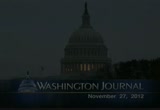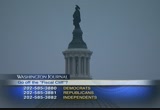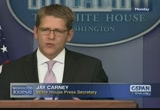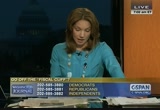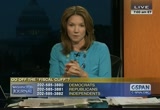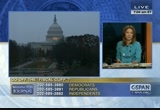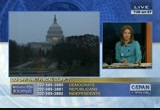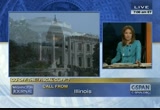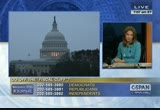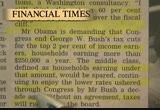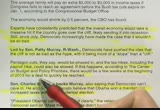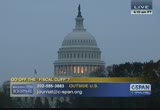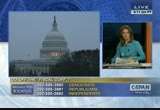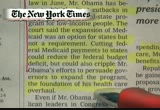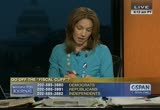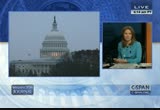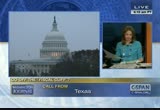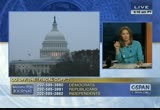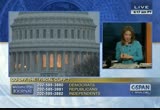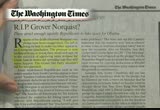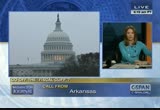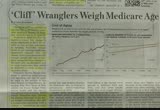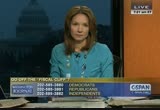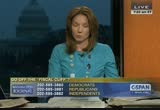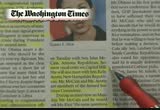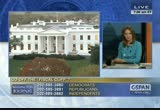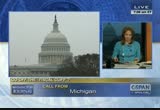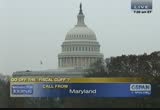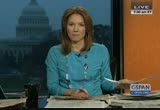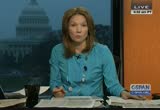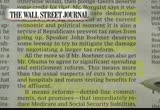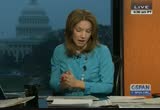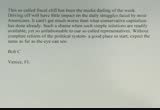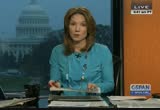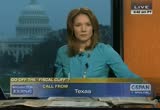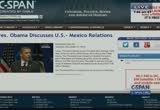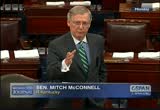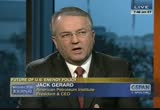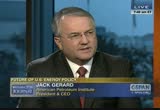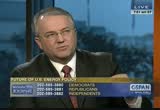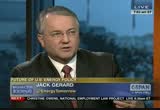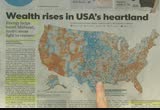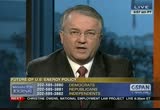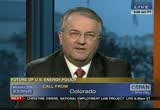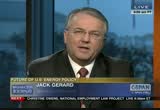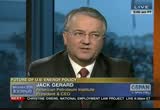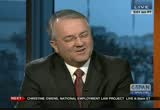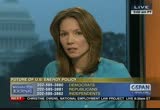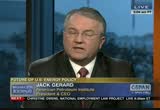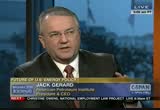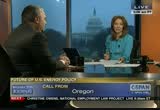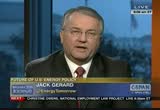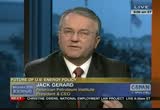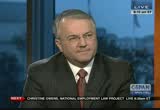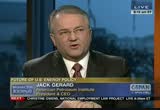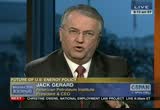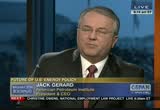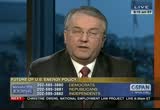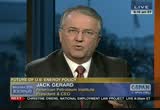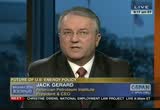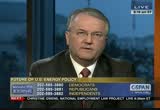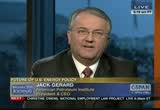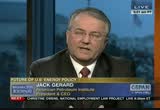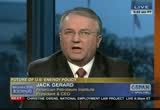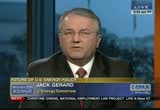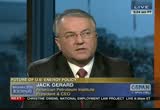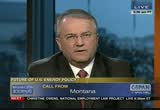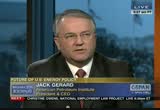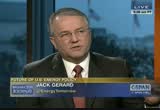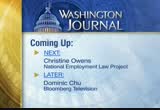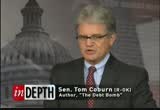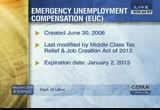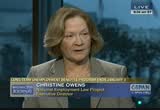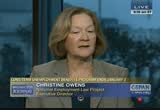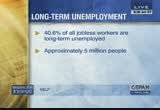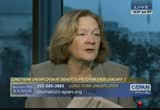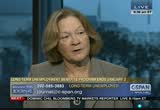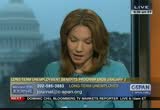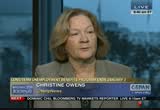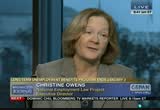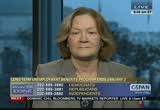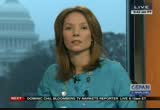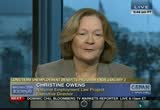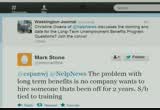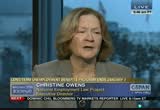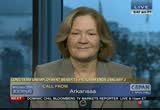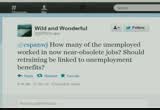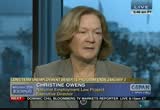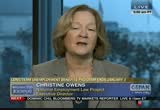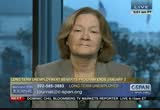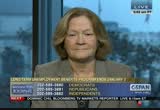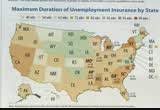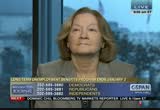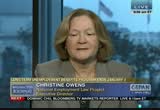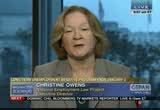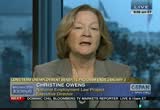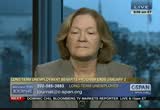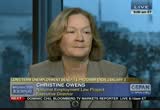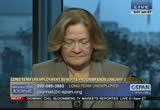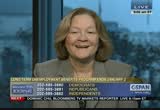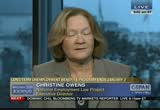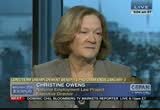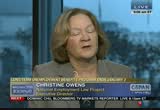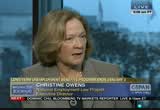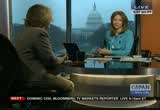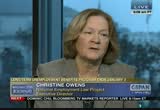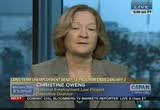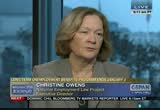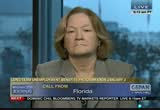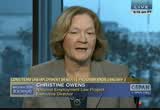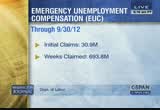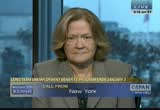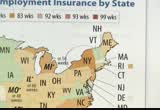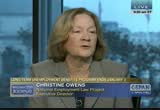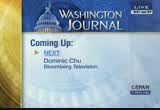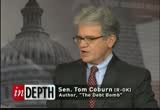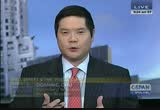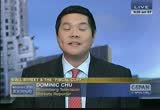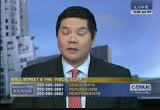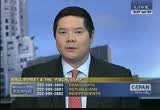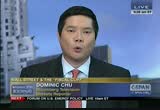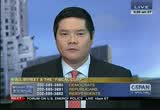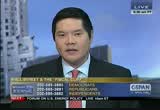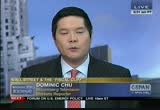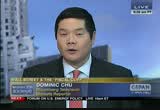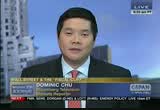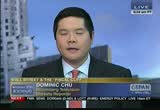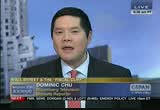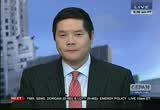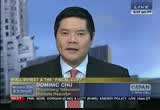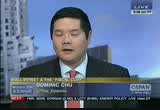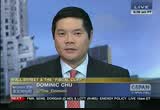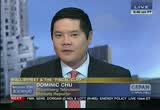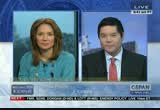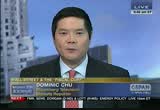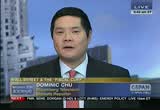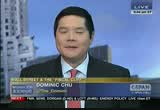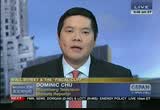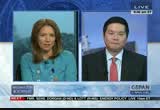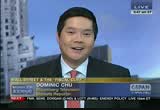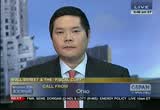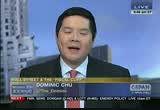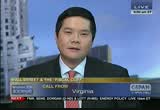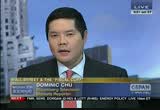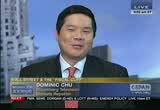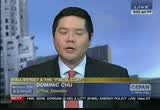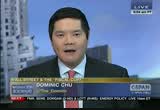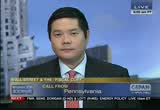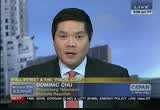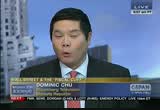tv Washington Journal CSPAN November 27, 2012 7:00am-10:00am EST
7:00 am
work the legislation regarding homeland security. ♪ >> "washington journal" continues. host: with 35 days to strike a deal, the two sides have yet to set up a face to face discussion this week. instead both sides plan to meet in separate meetings. liberal groups like unions are planning protests on capitol hill. prominent democrats are advocating a cliff diving. we want to get your take. should we go over the fiscal cliff? the democrats, 202-585-3880. republicans, 202-585-3881.
7:01 am
independents and all others, 2.202-585-388 yesterday at the daily news conference of the white house, jay carney the spokesman there was asked about liberals who are advocating going off the so- called fiscal cliff. here is what he had to say. [video clip] >> he spoke with john boehner. by the weekend and he will meet with them at the appropriate time as well as nancy pelosi and mitch mcconnell. so the process that he began is continuing. recanting you to be optimistic that a balanced approach is achievable. we know what the solutions are. it was senator who said that in an op-ed, one benefit of all of
7:02 am
the debate said we have had any discussions over the past couple of years is that we know what the parameters of a balanced solution for these challenges look like. and they include both spending cuts and revenues and entitlement reform. they have to have -- all three legs of the school of got to report of that. >> jay carney at the white house. was asked about the idea of going off the fiscal cliff. alan krueger, the chairman of president obama's economic advisers, he spoke about what would happen if we go off this so-called fiscal cliff. in this report put out by the white house, american consumers will spend 200 billion less in 2013 if the fiscal cliff is not averted according to this white house report. jay carney went on to say in this press briefing that
7:03 am
president obama believes and understands that in order to achieve a deal, a compromise, that everybody has to make tough choices and he remains committed. but this is what he said about social security -- the white house is less interested in tackling the rising costs of social security during the current talks. so that is what is the latest coming out of the white house on the fiscal cliff talks. the two sides not scheduled to meet face to face. as you heard from the prevent of the congressional leaders are the weekend and the two sides separately meeting this week in washington with business leaders and as we said, unions are planning protests on capitol hill. a lot to talk about with the fiscal cliff in washington. we want to turn to all of you and get this tape on this idea of going off of the fiscal
7:04 am
cliff. we will talk with glenn on our line for democrats, go ahead. caller: i would like to remark on how relatively quickly it sounds like the white house is willing to sell out. you know, if we go off the fiscal cliff, and pronounce our willingness to help the republicans the gate the pledge not to raise taxes by letting it expire and than any tax change to reduce taxes will be a tax cut, we will be glad to sign it. all of the super rich people who are now going to face the state tax on anything over $1 billion will be screening of their shoulders, the thing it. and rear not point to have $200
7:05 am
billion less in spending if after january 1 we sign a new tax bill. the fact that obama is administration is to make it sound like he is averting a catastrophe over the post 2013 -- it is an insult to people who know what is going on. host: if you think that -- do you think the president is not holding from one democratic beliefs? calving i really do not know. i just found out that ed rendell is supposedly a little type of democrat. he is one -- on one of these teams trying to figure out entitlements. this is a simple equation. we have about $800 billion more than necessary in spending. we have $800 billion more in
7:06 am
spending that goes into the pockets of those who run unnecessary tests, insurance companies and pharmaceutical companies. and if we relocate the like most of the rational world by civil nationalizing health care, that will take care of 80% of the problem. the other 20% has to do with the spending on the military that puts people in countries that nobody can identify on the back in order -- that nobody can identify on the bath. >> chuck in illinois, on our line for republicans, what do you think? caller: i am kind of angry about are people that we lack in b.c. for the next 35 days trying to make his big decision.
7:07 am
they cannot come together because they want to hold their ground and whenever it is. and -- one thing they should not do is to put us in a position where we go down this slope and we go back to what has been going on for the past two years. you fear an economic recession? if we go off the cliff was to mark the bank yes. it will not surprise me if that happens. host: what is your confidence level was to mark the bus odds. caller: 50/50. host: 50/50. they have said they
7:08 am
7:09 am
7:10 am
and the tax hikes including the payroll hike could also be slowed. charles schumer backs murray saying the democrats cannot caved in it. they want a mandate for increased taxes. yesterday, the billionaire investor warren buffett writing in the new york times says he thinks the country would do just fine if we do -- if we go over the fiscal cliff. on our line for independents, should we go of the fiscal cliff? caller: yes, i think we should. although people who want a budget reduction, it would save the country 4 trillion dollars. i was amazed at how fast the democrats adopted mitt romney's -- for these home deductions.
7:11 am
these people want to go around saying obama, obama wally is cutting your social security and medicare in your home deductions are really happy. we are not in this for nothing. nobody cares about us because we want to be so proud of president obama. and let him defund social security. the democrats have no intention of ending the debt ceiling now, because they want to give away more democratic priorities. we hostages. when the republicans have not given anything yet, that is what you get here you get your priorities cut. because you did not say a word.
7:12 am
7:14 am
often notes that this is what they would like to see from the president. they want him to start negotiations at a one-one ratio. putting them in line with many in the parties that want to see a harder line taken by democrats. some advocating going over the fiscal cliff. democratic caller, mary, what do you think? having delivered the cliff and start over. host: are you concerned about the economic impact? caller: i do not know why on earth -- i am on social security.
7:15 am
host: in order not to touch those programs -- caller: just kind of overhaul them. just fix them a tas -- tad. host: what about raising the eligibility age? caller: do not do that. i am 59. i might retire run 65. host: that is mary. on our line for republicans, kevin, go ahead. . caller: i think they should go
7:16 am
off the cliff. for the past four years we heard how terrible the bush tax cuts are. i think we definitely need to go to the clinton era tax cuts for every one. i think if there's a compromise always going to do is make the tax code more progressive. i think we all need to feel the pain. and i do think it would go into a recession because of it. but a recession is part of any economic life cycle. if you give the government power, what politician will say it is time to have a recession? you have to vote for me because i am going to make the economy worse. they just keep pumping more debt in the the economy. host: you are saying go over the fiscal cliff? caller: yes. it is not even enough in my opinion to balance the budget.
7:17 am
it is still about three times the average deficit under bush. let us go back to the clinton tax era. eileen anywhere between republican and libertarian. up -- yes i am not. i lean anywhere between republican and a libertarian. host: what do you make of republicans up on capitol hill -- to sort of a back off the tax pledge that he took when he ran for senate, saying he would not raise taxes. caller: if we are going to raise
7:18 am
taxes my important thing is raising them on everybody. because if they try to strike a compromise where only the rich get taxed, then it gets more progressive. it is not a point to help the budget. we are right to raise taxes, raise them all the way down to where clinton had them. host: senators lindsey gramm represented peter king, talking publicly abandoning the pledge of democrats will talk seriously about entitlement reforms. rest in peace, grover norquist? there are not enough republican
7:19 am
7:20 am
host: what you mean? caller: he was elected to make a choice for the country. the majority of the country. the republicans are wrong and he is right. and i think that he should let us what the fiscal cliff because the republicans are scrambling out trying to change everything. they need to mow them out. and change it then. but i think they should let them go off the cliff. host: are you on medicare and social security? having yes. cliff wranglers way
7:21 am
7:22 am
can understand it. there will not be any blind stops. because this is what we have got to do and we should do it. and i think that president obama should let it happen. host: raise taxes on everyone or those who make more than $250,000 a year? caller: on everyone. it is fair. we lived through a bush. i think we can live through this. host: ok. that is eddie on our line for independents. i am going to go back to the "the wall street journal." and plans this week over the fiscal cliff. house republicans planning to meet wednesday with business leaders including erskine bowles, a co-chairman of the 2010 deficit reduction commission, and president obama on wednesday is planning to meet with business leaders.
7:23 am
7:24 am
some quick headlines. tensions intensified in egypt as the muslim brotherhood president -- he has met with judicial leaders. that is the latest of egypt. and the los angeles times, syria is now a shell of its old self. the los angeles times reporting on that. and then this tension debate on whether susan rice should become the next secretary of state. this is the washington times.
7:25 am
but as far back to our discussion this morning for all of you. going off the fiscal cliff, some democrats are saying that the possibility and wouldn't be so bad. steve, on our line for republicans, what do you think? caller: i totally agree with the caller from texas who said that we should return to the clinton era tax law. just think of that era we had. we had a budget surpluses.
7:26 am
and we had a winning prosperity. i do not think we need to fear returning to the clinton tax law. and as the caller said from texas, the democrats have demonized the bush tax cuts. and so we will see with the demon is. the 47% who do not pay income tax from about 30% of them will return to the tax rolls. and at least the pain is like to be spread around here to everybody. and i find the connection of the grover norquist problem is that if we returned to the clinton tax law, then everybody next year will just want to reduce taxes and the republicans will be free to vote for those things without the pledge interfering with that. i think what would solve that
7:27 am
issue as well. so i think we would all be a lot better off. more dollars over 10 years. and it would come from every american. we have a huge problem here. and by the president's position of and not willing to dip below $250,000, is just as impractical as grover norquist's no tax pledge. i find the president's position just as intractable. host: here are some comments on twitter. we should go over the fiscal cliff. because everyone would have a horse in the race. and -- we should go off the cliff but make sure that every politician is held appropriately responsible. on facebook -- no, quit the out
7:28 am
of control spending. the last thing we need is another credit rating downgrade just because obama and his entire administration is incompetent. and -- we are already off the cliff. you are next. caller: i am quite certain the fiscal cliff is just a slope. and they have been playing chicken for the last 10, 15 years anyway. this time the rich started paying their fair share. i do not think we need to go to that now. what we need to do is get this economy back in gear and get new jobs going. and take care of the companies. host: how you do that? many people are saying in order to avoid this economy getting worse they need to have a grand bargain.
7:29 am
caller: it should be a gradual up slope thing. the point is to build the economy, not to shatter it. the depression will become profound. thank you. host: that was brian in michigan on our line for democrats. next caroline on our line for republicans, go ahead. caller: i this wanted to say that the house and the senate, were both democrats for many years. no budget was passed then. and our spending is way out of control. and the republicans are trying to put a stop on the spending.
7:30 am
and i also agree that all people should pay their fair share of taxes. host: ok. fiscal talks continue today. we are going to be covering the discussion with dick durbin, the assistant majority leader, democrat of illinois at any event today. live coverage on c-span, 11:30, c-span and, . if you miss it, go to our video library. on the front page of the financial times, stepping down from the sec. mary schaepiro is stepping down after nearly four years in charge of the top stock market regulator.
7:31 am
bill, maryland, on our line for independents. what are your thoughts? caller: i think we have already gone over it a long time ago. we are like a family or small business that is bringing in $200,000 each year. their borrowing in other $100,000 each year. and then you hear these people talking about, we are going to raise the taxes on the rich. what is that going to do? bring in other a thousand dollars and. it is insane. these politicians have screwed us, screwed our children. they just keep reelecting the same people.
7:32 am
in the wall street journal this morning -- they write this, why $16 trillion only hint of the true united states debt. the actual liabilities of the federal government including social security, medicare and federal employee future employment benefits already exceeded 86.8 trillion dollars or 550% of gdp. nothing like that figure is used in calculating the deficit. in reality, the reported budget deficit is less than one-fifth of the more accurate figure. so if you are interested in that, that is in the "the wall street journal." writing about with the actual debt is. we will continue about our discussion for about 15 more
7:33 am
minutes. should we go off of the so- called fiscal cliff? what do you think? we are getting your thoughts outside washington today. they are saying this might not be so bad. on our line for democrats, randy. caller: the cliff is only a slope. and i think that is the most fiscally responsible thing to do. my republican friends are always worried so much about the deficit. it scares them. let us get it in line. the will to get these taxes back. we all agree with him then. to get the house in order. and the republicans came in and ruined it.
7:34 am
president obama made the mistake i believe of putting both wars and prescription d drug plans back on the books. he should of left them off of the books. and then we would about how little they care about debt and deficit. and that would have been good. host: here is the "the wall street journal." grover norquist is not the problem.
7:36 am
i do not think we should go off the fiscal cliff. go up to $150,000. the rich should pay a little more. we also need to get rid of the programs that the democrats are so willing to hand out. host: what are some of the programs? caller: head start. um -- to live for free, section /. host: what do you think about unemployment benefits? caller: it should go back to six months. host: democrats seek more benefits for jobless. this story by seth says more
7:37 am
7:38 am
off of it? illinois, on our line for independents. caller: good morning. spoke to several years back. do not go to war for bush. we are spending $1 trillion a year on a war in afghanistan, which is senseless. bring those troops,. that is over $1 trillion a year. turkey, they build pickup trucks for general motors. shipped to the sales room, that costs them $7,000, they turn around and sell it to us for $18,000. let us get an import tax. what about those import taxes. to equalize the funding for the united states. the import tax should equalize
7:39 am
$20 an hour american dollars. that will put us on their feet. as far as cutting medicaid, whited biggest toss me out in the street. because i live strictly on social security. and without medicare i cannot possibly make it. our congress is too busy investing their money in the industrial -- to make a ton of money on the war. why we have 10,000 troops in germany? bring a lot of those home. host: here is bob.
7:40 am
7:41 am
and black friday, to results are in it. usa today money section, business at top retailers up 26.6%. the economists are saying, and retail sales amount of last year to a little over $60 billion. this year their projected to be about $79 billion. also, this side story on the economy and a shopping. this from the usa today. for the second consecutive year, prospective gun buyers joined black friday shoppers and record numbers. speaking of the money and costs,
7:42 am
the new york post front page, the governor there in their york gov. cuomo says the price tag should be about 42 billion in economic damage. possibly worse than hurricane katrina. go ahead.n, we lost her. chris, on our line for what do you think? caller: there has been a lot of greed here in america. there has been away too much to double spending, preparing for obamacare to be pushed. also, i think there is too much spending is going in to government aid.
7:43 am
it is too much. i cannot see why people would rather quit their jobs and be taken care of by the government. host: the opposite to that issue is a national security issue which must be addressed. but what affected the cliff on the economy? as we to do, one of the chief economists or out during the press briefing with a new report warning that consumer spending would fall by $200 billion in 2013 if we go off the so-called fiscal cliff. chris in rockville, maryland. on our line for independents. should we go off the cliff? caller: no. i believe we should come up with a comprehensive balanced budget plan. and the reason i am not calling
7:44 am
it, i believe some people are misinformed about the reason for this deficit. i believe that both democrats and republicans are responsible for this large deficit that we have it. they did have a two different philosophies on how to increase. democrats love to spend. of the same time, republicans tend to borrow and spend a. is impossible to earn less, borrow and spend more and create a surplus. from the republicans' side, i believe if you cut every discretionary spending program, it will not help balance the budget. discretionary spending only represents 10% of the overall budget. host: thank you very much. program note for all of you, the incoming leader of mexico is set for a white house visit today. look for our coverage on c-span
7:45 am
.org. they will be getting to the other to talk about trade, immigration and drugs. up next, we will turn our attention to the future of energy policy with jack gerard. and then we will become an station program, set to expire in january 2, christine owens will join us to talk about that. first, let me show you the front page of the "washington times." with the two leaders of each party in the senate. mitch mcconnell and harry reid. yesterday, at the two had a little dispute on the floor. they threatened filibuster change and he can to the floor to talk about that. the washington times says they had a rare head-to-head debate on the senate floor. take a look. [video clip] >> we believe that there should
7:46 am
be one aspect of it changed and that most of the procedure be a -- simple as that. the american people agree. >> only ones who disagree think this is working well as the republican leader and the republicans in congress. >> up the majority leader will stay on the floor. you did not address that issue. >> but of course -- that statement is untrue and i do not accept that. >> that is the point. what the majority leader is saying is that he will break the rules in order to change the rules. it has been the case in the past that it took a supermajority of 67, which of
7:47 am
course, meant most role changes occurred because they agreed to them. instead, what they are saying is that he will propose to change the rules with 51 votes meaning his side gets to decide what the rules are. and the date of that is, let us assume a kind of the majority leader must think he will be majority leader forever. but what if it is two years for now. what if my numbers say, 51 democrats can change the rules of the senate, why can't 51 republicans? why should we have to fill with these people? what is the point? why not just change the rules of the senate and turned the senate into the house. >> "washington journal" continues. host: we want to welcome jack gerard, ceo of the american
7:48 am
petroleum institute. let us go back to campaign 2012. the american patrol in the institute spent about 858,000 on the campaign cycle. total contribution to pacs over $650,000. and contributions to candidates, $217,000. given that you spent a lot on mitt romney's bid, how you think this will impact your ability to communicate with the white house and with the congress. what you think your relationship will be? guest: we ran what we call a vote for energy campaign. which was focused on elevating energy to beat a top issue. we believe it was highly successful. the reason it was is because you heard both candidates, they are both giving an endorsement of natural gas, as a cheap form of energy in an odd states to create jobs and help with our economic recovery.
7:49 am
the dollars being spent were not partisan in nature, we were not supporting one candidate over the other. our candidate was energy and we were focused on elevating that content to a higher level. that is what we have achieved and we feel good about that. we believe the president has moved this almost 180 degrees and a positive direction to say we can become more energy self- sufficient. and in doing so create hundreds of millions of new jobs. millions of the billions of dollars in tax revenue and make us more secure and less reliance on outsiders. it was about promoting energy. host: do you support mitt romney's bid? guest: we do not support anyone in particular at all. --
7:50 am
he has spoken about raising taxes sent into action. reading the best approach is to allow the developing energy resources, and from that developed vast amounts of revenue to the government. people did not realize that the industry contributed $86 million a day to the federal government. the best approach here is, let us develop the united states resources, put our people to work, create more taxpayers and in the course of that coming generate billions in need, to create trillions by 2025. that is the right policy approach. not single out an industry for punitive treatment. we pay not only our fair share, we pay more than our fair share. host: the process of extracting that natural-gas, fry king. what regulations are coming
7:51 am
from this administration? -- frackking. what regulations are coming from this administration? guest: what has made it possible for us to talk about energy security -- by 2020, if we produce our energy return united states, we will surpass saudi arabia. now think of that. that is a big change for the country to make us more energy secure, producing our energy resources. the technologies we use today to open up this vast resources, as well as oils. but we couple that with a horizontal drilling. so today we control and to great depths and turn ago were as of late for an extended lapse of distance where we can produce oil and natural gas like never before. the states regulate the oil and gas industry.
7:52 am
those states were busted the activity is occurring, pennsylvania, ohio, north dakota, they have already taken action to regulate the industry and have done that appropriately. we support a robust regulation reduced to think we do too far you can discourage the very thing you are trying to create. host: i think governor cuomo's but to make a decision on natural gas for his state. what is its stake? guest: he is the one governor that has lagged a little bit purity announced lost week that the report will once again be delayed and will not be produced until early next year. we believe we can do it safely as we demonstrated over the 65 years we have been using the technology. years one key factor. -- here is one key factor. we drove over 1.2 million. and there's never been a case
7:53 am
of a ground water contamination as a result of hydraulic fraking. host: here is the "washington times." freaking out over fracking. there are poisoning our drinking water. said one opponent, referring to the oil and gas industry. the you say with the utmost confidence that this does not have any impact on drinking water? guest: absolutely. but the impacts on the environment. we are highly regulated. the industry takes its own initiative, the gold standard. we promote that across the industry. many regulators, and after we develop these practices and adopt them as a regulatory issue because they are tough, they require high levels of performance. and that is the nature of the culture of our industry. we live in those communities.
7:54 am
we want more than anybody to protect those environments. a lot of this is scare tactics by those two fundamentally this. we need energy. the president has the knowledge that. oil and natural gas produced a lot of the energy we consume today and is estimated to provide over 50% of our energy 50 years from now. we need the resources. how we produced it in a safe and sound fashion to protect the environment and the work force? we can do that. our history shows that we can do that. and we continue to do that into the future. host: -- greater public awareness helps their cause. what will be the response?
7:55 am
guest: led us back to the truth. we always you debase our conversation on facts. we had not reached do mr. damon about the industry, there were not interested in that. there will be a lot of half truths. and we will respond to it. when you get to the bottom line and the facts, oil and natural gas is produced safely in this country. the opportunity to improve technology and have a significant breakthrough. it is a gamechager to employ our own people. produce revenues to government. make this energy secure. those are big issues, big opportunities. should not overlook those. >> the front page of usa today, walt rises in the heartland. some of these rural areas in the
7:56 am
middle of the country seeing their unemployment rates -- related to the energy boom. guest: that is right. much of it is tied directly to energy. the recession would have been much deeper it did not have been for the energy and gas industry. one thing we like to remind people, you look at north dakota. i say little. today they have the lowest unemployment rate in the united states they have become the number 2 oil producer in the country. the median income in north dakota is about $90,000. they are listed budget surplus. the last estimate was $1.6
7:57 am
billion. it is a big deal. it can happen right across the country. pennsylvania has seen over 80,000 new jobs over the past years. they now have the opportunity to participate in this great opportunity to make us more energy secure and create jobs. it is a big deal. host: on our line for independents, you are on. go ahead. caller: but me ask you a question. what about the liberte raid in alaska? is it something like, they are drilling down 40,000 feet? they stopped it for the last 10,000 because they want to put a damper on the oil in the middle east? isn't that true? guest: i assume you are talking
7:58 am
about the shell operations. that is what you are talking about, let me give you a backdrop, we have been in a process for over five years, they have invested over $4 million and those operations, and only this summer were they allowed to have a partial drill into that area. they now come off those areas and expect to go back and next summer during the summer drilling. but we have vast resources. of hundreds of millions of barrels of oil. cleaner-burning natural gas which i might add, has driven carbon emissions down to 1992 levels. it was merely because we had a supply of natural gas. host: we will go to dave on our line for democrats, decver. go
7:59 am
ahead. caller: what is the son back to the keystone pipeline if it comes into production? what is the approximate percentage of those petroleum products that will be retained in the united states? guest: thank you for the question. coming from denver, you have a great governor out there, a big proponent of oil and gas development. thanks to you and others out there who support this robust development. on the keystone xl pipeline we haven't been disappointed that it has not been approved. there are 20,000 jobs associated with that. what we see today is hope that the president will approve it. next few months. that will be one of the first tests as to what he promised the american people during the campaign, that he would support the development of oil and
8:00 am
natural gas. many people associate the keystone of xl pipeline only with canadian production. but just a moment ago, a lot of the production comes from north dakota and from montana, we are moving it is expected it would be used domestically. we can produce all that the country needs and are exporting a little bit. the more will bring into the marketplace, the more downward pressure on prices. we're hopeful the president will approve the keystone pipeline. there is no time limitation on the president. host: who do expect will make that announcement?
8:01 am
guest: i expect the president will announce that decision. host: do you continue to have direct communication with this white house? guest: we continue to have an ongoing dialogue with the white house. senior people wanted to talk about the role of energy. we talk about what else we can be doing to get the economy back on track. our dialogue continues. that is the approach we have taken. on other areas we can find common ground and we hope to do that moving forward. we have those talks at the appropriate and highest levels
8:02 am
at the administration. host: not going to tell us with whom? guest: we will keep that as a private conversation. caller: it affects us all lot in bismarck. retail is unbelievable. it extends westward from where i'm at and east toward. ward. i have never seen anything like 9it. it is unbelievable. host: do you feel you're benefiting indirectly from this industry? caller: no, not really.
8:03 am
i have good hopes for my state. i am retired. i remember years of poverty and things were not going well. it is almost like the gold rush. guest: you have seen that tape placed in your great state -- you have seen that take place in your great state. north dakota is the number two oil producer. texas is the only state that surpasses them. that isn't an increase of about 60,000 barrels a about a decade ago -- that is an increase of about 60,000 barrels.
8:04 am
many of the stays becoming major energy producers -- many other states becoming energy producers. put a lot of people back to work. host: here is a question from stella on twitter. guest: yes. the oil and natural gas industry contributes money to the fed or government. we pay billions of dollars in taxes and we are happy to do so. are all one request is you did not single out the industry for punitive tax treatment -- our only request is you do not single out the industry for punitive tax treatment. we talk about issues like fiscal
8:05 am
cliff, we are all for that. we believe policy should be neutral and equitable across all industries. we're anxious to get to the table and to talk about tax policy. we believe the corporate rate in the united states is too high. we're anxious to contribute to the overall recovery of the united states and we believe we're doing that now. host: there have been record profits by the oil and gas industry. is it not fair for them to pay more? guest: the reason the numbers are high is because they are large companies. they compete against foreign governments.
8:06 am
we're not even the top 10 on a global basis. look at it from the perspective based on dollar of sales. we fall somewhere in the middle of other companies. apple computer is far more profitable than the oil and gas industries. tax policy should be equitable across all industry. we know what the rules of the game are. if you invest money for oil investments and you're allowed to recover that cost, all companies should be treated equally. we should say here is the tax policy of the united states. let companies compete against each other. host: go-ahead, will.
8:07 am
caller: thank you. i would recommend "book tv." each of us has an energy sufficiency. i met atmosphere scientist with over 35 years of experience. a storm like superstar on sandy is a storm we have never seen before -- a storm like super storm sandy. it is due to industrial pollution from burning fossil fuels such as petroleum. some might question is this. how much responsibility does
8:08 am
the petroleum industry willing to take for superstar sandy and other climate disasters that are looming on the horizon? how do you justify using billions of years of energy accumulation through your own individual wealth? thank you very much. guest: thank you for the question. the oil and natural gas industry are leaders in alternative forms of energy. we take our responsibility very seriously. we have invested more than the federal government in these different forms of energy over the past 10 years. to nobodycond seat
8:09 am
for energy future. we understand our role and are looking always for new energy forms. we have a vast diversity of energy that we produce. climate has been a discussion in the united states for the past decade or so. carbon emissions right now are at 1992 levels. the economy has slowed down and we need to get people back to work and to get the economy recovered. we're burning a lot more clean- burning natural gas today and that is displacing other forms of energy.
8:10 am
that was made possible because of four hydraulic fraction. the price has been pushed down from about $13 to about t$4. 3. we do understand the relationships between various forms of energy. we take our responsibility seriously. we have the lowest commissions in many years. host: the climate change conference is taking place in qatar. a new round of talks is beginning. the developing countries have
8:11 am
been asked to focus on the essential tasks ahead. what are you concerned about this? guest: i think the united states should go over there with her head held high. look how we reduced our clean burning emissions. we're back to where we were 20 years ago. too many people expect to have an answer immediately and you can do that in energy policy. it took us 100 years to get off wood. we to focus on realistic aspirations. that is what we should be talking about. host: back to the keystone
8:12 am
discussion on twitter. guest: well, let me back up. oil is set on a global market basis. the price is determined by global factors. the united states is part of that global markets. the important thing to remember is the united states by 2020 could surpass saudi arabia as the number 1 will producer in the world. anything we produce contributes to the global marketplace, thus pushing the price down. part of the solution is to focus on the united states and create well paying jobs and make us
8:13 am
more energy secure. if we can produce it right here at home, we will be better off. host: darnell in waldorf, maryland. caller: will companies and gas companies want to suppress solar -- oil companies and gas companies want to suppress solar. they hid the chemicals that they are using. if you think you can pump chemicals into the earth -- guest: let me add a few facts to that comment. we should have a true all the
8:14 am
above that includes solar, wind in addition to oil and natural gas. the amount of chemicals is very minuscule compared to the water volume and the sand that goes down. that is used to create the pressure to crack the rock. it water tables are 400 feet near the surface. et.re down about 8,000 fe it is impossible for anything to migrate up to those water tables. there has been no contamination of groundwater as a result of hydraulic fracturing. that is a fact.
8:15 am
people say we should not be consuming fossil fuels. we can have a good discussion about what the energy policy should be. each not be injected with fair -- it should not be injected with fear. caller: good morning. what an interesting show. a question about the law that requires ethanol to be used in a motor fuel when there is new technology from a corporation that uses coal or natural gas to make ethanol at approximately half the cost of the current corn-based program without any government subsidy.
8:16 am
when that makes sense -- wouldn't that make sense? guest: there are different forms of renewable energy that is out there. you talk about corn-based ethanol. a fuel standard that was created it is not workable. there was a petition saying it is driving up the cost of food and feed for cattle because of drought in the midwest and we should with that requirements. we believe the current law is unworkable and needs to be changed. we will be working with the congress to get back to a more free-market approach as it relates to forms of energy.
8:17 am
we shouldn't pick winners or losers. the government should not pick a particular company or technology. let the market drive those. new technologies will emerge because the market will incentivize those, or to add to the mix. host: here is seadog on twitter. guest: we have a number of fleets have moved to compressed natural gas in their vehicles. they go out on their drives each day and come back work they can fuel. the cost of the filling station is costly.
8:18 am
i believe you will see it felicitations more and more scattered across the stations -- i believe you will see filling stations more and more scattered across the country. the vast production of natural gas has driven the price down to where it is competitive with gasoline. host: john on the independent line. caller: we import most of our oil from the middle east. we have more oil than we need in this country. i feel that energy could save our country and do a lot for this country.
8:19 am
i would like to get in touch with mr. gerard about a proposal. it was brought to the congress in washington. a congressman mel the to mitt romney -- a congressman mailed it to mitt romney. mitt romney lost the election. we refine the oil here. it creates no more pollution than if we dug our own oil. host: ok, john. guest: i am happy to visit with you about these things and you can send me a note to look at something. our number one trading partner
8:20 am
for energy is canada. they will continue to grow that relationship with things like the keystone xl pipeline. that is another reason we think it is an important decision to be made by the president. we could be producing our own oil and natural gas right here on our shores and making us more energy secure. we are supportive of that approach. the demand in the united states for energy is only increasing. it is expected to increase 20% over the next decade. host: will go to john -- that
8:21 am
was john. we'll go to jail in tennessee -- caller: wide to the oil companies selling the oil overseas instead of keeping it for future generations here? guest: we consume all we need right here in the united states today. don't be confused by the amount of export. we have oversupplied the marketplace. we need to look at that longer- term and focus on making ourselves self-sufficient. we import about 40% of energy. today it is less than 50% and
8:22 am
ultimately we could get it down to a very small amount. we could be energy self- sufficient in the course of a decade, at 10 or 12 years. that is a big deal. it would change the deal political dynamic of the world, particularly the middle east. that would change the balance of power around the world. host: natalie asked a question on twitter. guest: one might suggest we have a national oil exchange in place and that is called the free markets. through the market mechanisms, there is a global price set on crude oil.
8:23 am
our focus should be on the supply side of that equation. we cannot control a lot of the unrest in the middle east. what we can control is how much we contribute to that global marketplace. we believe that is where our focus should be. by producing our own, we hope we would put downward pressure on the price. host: markus on twitters. guest: most of what has occurred to get as to our higher levels of oil and natural gas production have all occurred on private land.
8:24 am
96% of all the new development in the united states has been on private land. the administration has control over federal land. that is where we believe we have missed an opportunity. that is the policy changes that we need, where we begin to look at the federal land equation and we try to develop a mechanism to encourage the development of all that energy resource in a positive way. host: are we talking about national parks? guest: no, not at all. the national parks would not be part of this equation.
8:25 am
host: how much oil and gas is there? guest: millions of barrels. it is industry that finds that. the federal government does not know how much they have. we take the risk. the taxpayer is not at risk. we pay for the right to continue to look and pay a royalty on everything we produce. it is a triple win for the government. we put private-sector dollars at risk. we generate billions of dollars of revenue to the government. the republican call in
8:26 am
montana. caller: i want the democrats to stop. i see what is going on. there is a lot of drilling going on. it keeps these towns alive. the oil countries are doing such bad things. these towns would dry up. i hear people griping about the oil companies that are so vast. host: do you work in the industry? caller: i work on a cattle ranch. my boss has to rely on a lot of oil and the prices keep going
8:27 am
up. it is tough for him. if it wasn't for these people that are doing all this, we would be in trouble. if the price got out of hand, i would lose my job. host: kelly's sentiment is echoed in the newspaper, "usa today." guest: it is amazing what is taking place. most of us wish we could live in montana. something else is taking place and that is the multiplier effects that take place in the economy.
8:28 am
we are talking about a manufacturing renaissance in the united states that is driven by natural-gas development. that is the input cost. chemical companies, their primary form of feedstock is natural gas. cosmetics and the list goes on. natural gas is the driver. we are able to bring back major manufacturing facilities. two or three it will take place in the upper midwest. it is so important we get the energy policy right.
8:29 am
there will be an affordable form of energy for years to come. then it will make multibillion- dollar investments. host: what regulations would you be open to that would get environmentalist confident that the hydraulic fracking is safer? guest: there are many groups like the sierra club that have launched a campaign. their goal is not to produce natural gas in the united states. they do not want the production of the resource. we believe we can address any concerns that are raised. talk about the water issues. we need to be careful we don't
8:30 am
over regulate the activity. the government has 10 agencies looking to regulate this technology. it is already being regulated at the state level. "we know how to regulate these industries. do not overreach." we run the risk -- you chill the basic economic activity you're trying to create. host: thank you for a comeback. next will focus on one part of the so-called fiscal cliff talks, the emergency unemployment compensation program. talk how wall'll street is preparing for the so-
8:31 am
called fiscal cliff. >> more on energy. climate talks are intensifying. global warming could be made worse by falling -- carbon dioxide and methane emissions are also an emerging issue. hes have broken out. the protesters want the egyptian president -- the clashes are taken place near the u.s. embassy and in tahrir square. talking about security at sea and steps to bolster the united
8:32 am
states military presence. the meeting comes days after china began landing planes on its sole aircraft carrier. china has criticized moves in the pacific as plans to contain china. those are some of the latest headlines on c-span radio. >> on 16 or 17 basis, we have military-run schools. the cost to educate a student is $50,000, almost four times what the rest of public education costs. the vast majority of our bases we use public schools. we take the money and pay every public school system $14,000 per child and save billions of
8:33 am
dollars per year with the same or better outcome. >> you can talk with senator tom coburn on "in depth." the senator has written several books. join us for medical doctor and author tom coburn live on sunday on c-span2. "washington journal" continues. host: christine owens is here to talk about long-term unemployment benefits. part of the so-called fiscal cliff talks. let's talk about what they are. guest: federal benefits that
8:34 am
kick in when someone has used up their state unemployment benefits and is unable to find a job. that person can collect additional benefits to this program. these benefits may range from 14 weeks or as many as 73 weeks counting the state benefits and the federal benefits. it is a crucial lifeline of support. host: what is the difference between this program and traditional unemployment benefits? guest: this is a program that congress has adopted in the past when the recession had officially begun. it is designed to reflect the fact that we're in a national crisis of high unemployment and
8:35 am
limited job creation. it 26 weeks of state unemployment benefits are not going to be enough for most unemployed workers because it is so hard to find a job. the government steps in and provides additional benefits that are funded at the federal level. the number of weeks depends on the state's unemployment rate. host: how long can people stay on these benefits? guest: it depends on the state's unemployment rate. one has been unemployed for 26 weeks and has run out of state benefits. they can get an additional 14 weeks of federal benefits.
8:36 am
people are eligible to get up to an additional 37 weeks altogether of federal benefits. the total number of weeks in states with unemployment rates above 9% would be 73 weeks and that includes the 26 weeks of state benefits. host: we have the fourth line satisfied for those that have been on long-term unemployed benefits -- 202-585-3883. guest: long-term unemployed means anyone who has been unemployed for least six months and cannot find a job. we have 5 million unemployed workers. half of them have been unemployed for a least a year.
8:37 am
the official definition is six months or longer. host: what happens on january 2, 2013? guest: congress has renewed this program 10 times since 2008. individuals already on the program could continue to collect benefits until the teair were in expired. this time, it imposed a hard cut off. if the program is not renewed before the expiration, everyone -- 2.1 million unemployed workers -- collecting benefits will be cut off immediately. there will be no gradual phase- out.
8:38 am
that means 2 million unemployed workers love no benefits at all by the end of the first quarter of 2013. 940,000 will not have a federal program to fall back on. an obvious impact on individuals and their families. a big impact on the economy. for every dollar spent, as much as $2 is pumped back into gdp. these are folks that have to spend their benefits. an important aspect is that it keeps people connected to the labor markets. someone collecting benefits has to be looking for work. that is a requirement.
8:39 am
that have to do an interview with the state agency and have to have a plan. people on unemployment benefits engage in much more job-seeking activities than those who do not. if the program ends, it will have an impact on the economy. we will make it harder for the unemployed workers to find jobs. host: the white house put out a report yesterday saying if we got the fiscal cliff, there will be $200 billion less in consumer spending. some folks disagree with the theory of unemployment benefits. here is a piece in "the new york
8:40 am
8:41 am
have even more because of tax cuts that benefit them disproportionate have not pumped more into the economy. low income workers and unemployed who spend what they get on basic necessities are what keep the engines of the economy going. these are folks that shop at the local groceries. this is the kind of pocketbook, kitchen table economics that keeps the american economy humming. it has made a difference in the downturn. the joint economic committee, many economists have looked at this and of all concluded that the impact of unemployment
8:42 am
benefits is substantial and that unemployment benefits are one of the most effective stimuli that we can pump into the economy. host: christine owens is our guest. daniel in massachusetts is up first. are you on unemployment long term? caller: i graduated last year from a local university. i have not been able to collect because i could not get a job since i graduated from college. it is funny how you look at the white house and the representatives that are supposedly representing us. they want to pass all these cuts towards these social programs. i find it ironic that you go out
8:43 am
and see people on wall street. every transaction they do, they do not pay any tax. if you even put it 1% tax for every transaction that wall street does, it would pay off everything. they want to put cuts and regulations toward social programs that people have paid into. at the same time, the old sure wealthy -- the ultra-wealthy, they do not pay nothing. host: this is "the new york times." can we afford that?
8:44 am
caller: just put a 1% or 2% tax on wall street. they don't have to pay iit. host: christine owens. guest: daniel makes a couple of good points. ger of thes the ancho american people. they are paying the price and there is a question of equity, who should have to bear that burden? we can address long-term deficits without taking into account the basic livelihood of working people and the poor and we should be examining those
8:45 am
approaches. he said he just graduated and cacannot get benefits because he cannot get a job. we have around 5 million people on unemployment altogether. one in three people today collect unemployment benefits. you have to be unemployed because you have lost a job. daniel did not lose a job so he is not eligible for unemployment benefits. everyone collecting unemployment benefits has worked and many have worked for many years and not able to find work. ont: here's marc stone
8:46 am
twitter. guest: i think that that is a problem but for a different reason. there is tremendous bias against the long-term unemployed that takes the form of discrimination. there has been legislation introduced that would ban refusing to consider somebody for a job just because they have been unemployed for some period of time. many unemployed workers are very busy. then it are doing volunteer work or taking courses. they cannot get through the door. there is a nothing about unemployment benefits that keeps them unemployed. people on benefits are much more actively looking for new jobs and the unemployed who do not have benefits.
8:47 am
there is no connection between unemployment and long-term unemployment benefits. host: keith in arkansas. caller: good morning. the lady is still talking. host: you have to turn your television down. caller: can i talk to the lady? host: absolutely. caller: good morning. how're you? guest: i am fine. caller: i love everybody in this country. i can employ everybody and i can employ a my own self.
8:48 am
i am on disability. i've been on disability for 10 to 12 years. i haven't eighth grade education but i can fly airplanes -- i have an eighth grade education but i can fly airplanes. dashld even find the-ligh lights. host: what is your question? caller: i do not know why anybody in america is unemployed. the fellow on the farm -- he will have natural gas without drilling. host: wild and wonderful on twitter.
8:49 am
guest: i can give you a precise figure for how many unemployed workers are in now near obsolete jobs. the highest rate of unemployment is among construction workers. the housing market has begun to recover. there has been some pickup in hiring in those jobs. we have heard that many manufacturing jobs that have been lost are now obsolete. there is no hiring going on in smart manufacturing. i do not know -- some of the jobs we have lost will never return but i cannot give you a precise figure. it is reasonable as part of a policy response to long-term unemployment to make sure that
8:50 am
we're providing meaningful retraining opportunity for workers, the kind of services that workers who have been in one industry for many years and will need to transition into another industry, the kind of services they will need to make that transition. that is another area where the amount of federal resources has declined. with computer technology and automation, being unemployed today is different than it was 10 years ago. people search for jobs online. we no longer have the situation in which someone can sit down and talk to a job counselor and a state employment office.
8:51 am
some of that is finding ways to pay for training that will enable that transition. host: william is in florida on the line for those that are long-term unemployed. caller: good morning. i've been unemployed since 2008 . i had a front-row seat for the housing bubble. i was in a position to make a lot of money on new construction. i had a painting company and was invested in new equipment. all the sudden, the "for kept coming off
8:52 am
the house is. you have to adjust your thinking. i am a freelance artist and a free-lance writer. "there is no such thing as a bad experience for writers, only good experience." you have to take stuff to the pawnshops and borrow money from relatives. this is still in plan for opportunity. for a lot of us, it gets to be a war on the poor. there is job training. how do you sustain yourself? people give up looking for jobs.
8:53 am
you just don't have one. the unemployment rate is higher than what the official numbers are saying. guest: he is absolutely right. the unemployment rate if you take into account the people working part-time hours and the people who have had to look for work but have dropped out of the labor market and even people who have recently graduated from high school or college and are not looking for work -- the unemployment rate is closer to 20% than 7.9%. i think his story is a compelling story and i congratulate him for turning lemons into lemonade.
8:54 am
he is in the state that has been hit the hardest. the governor has begun to clampdown -- mention the war on the poor. changes have greatly reduced the share of the unemployed who can even get benefits. 16%, whichlen to is almost unheard of. we have seen a punitive attitude towards the unemployed as if they have done something to deserve this situation and should be punished. the economy is still very punishing to the long-term unemployed. host: this is the maximum duration of unemployment insurance by state.
8:55 am
florida is on the lower end compare to some states. guest: that is a somewhat dated chart. the high end was 99 weeks. the maximum number of weeks is 73 weeks. the state of florida is on the low end. host: this was updated november 2of 2012. welcome, dan. you're on the air. caller: good morning. this is another extension of the entitlement society. we would not have to have this continued discussion about how long people have been on
8:56 am
unemployment. it is more of the entitlement society. i believe that romney cost himself the election by making comment.n i think 30% of the country thinks they should be able to sit around and not do anything. what has the president done? passing nationalized health care. everybody who has a brain in their head understands nationalize health care has not worked in europe and canada and it will not work here in the united states. guest: i take issue with a couple of points.
8:57 am
this is an entitlement society. i am glad my mother was able to get social security and medicare. she earned it and she got it. i'm sure the seniors feel they paid into the system and the earned it. payments are made into the system based on work that individuals do. when they lose their jobs, they get this insurance. they get what they pay for. entitlements.uncommo it enables them to search for jobs. the president passed a remarkable recovery act program.
8:58 am
it wasn't as much as he wanted initially. it created or saved millions of jobs and save millions of people from falling into poverty and created the strongest unemployment insurance program the nation has ever had. host: people have paid into the unemployment insurance. "the washington times" talks about extending the benefits for one year. have americans paid in enough to cover the price tag? guest: that is something that can be made up for in future years. compared to some expenditures and some revenue we forgo because of the tax rate on capital gains, it's not a huge
8:59 am
amount of money. it is a huge amount of money in terms of the loss to the economy if we do not continue these benefits. host: congressional leaders have been tight-lipped about how that might pay for the program. blair, long-term unemployed, go ahead. caller: i have a pretty good question. i've been trying to get to you since july. i have been unemployed since then. all this is going to end on january 2 or whatever. i have been doing everything right. how does that affect me? people who do try to do things
9:00 am
the way you're supposed to and things. is it going to end right there? guest: this is an example of the roughly 9000 people who, in january, or in the first quarter will have used up their state unemployment benefits. i hope blair can find a job. he is looking for a job and doing everything right, but team may not be able to find a job before his state unemployment benefits ended he is the kind of individual who should be able to claim these federal emergency unemployment benefits because he cannot find work in teams the benefit to support himself and his family. if the program is not renewed, when his state benefits end, that is the end.
9:01 am
host: much do you get in state unemployment insurance? caller: >> unemployment insurance? host: your benefits to collect from the state. caller: might take, $620. -- my take home is $620. host: if the program is extended, would begin more or less? guest: he would get the same thing. host: next caller from fondle lac, wisconsin -- fon du lac. last guest kept mentioning that they would employ more people and they would pay more taxes and that is the carrot they're putting out
9:02 am
there to possibly to lift regulations on whenever they're trying to do. i just would like to see more talk about by a don't corporations invest in employing people when they cannot? just to show that the proof is in the putting of the once they hire people when they start spending their money, becoming consumers, once they start making money and are employed against, they may vote to change things. maybe they could be a little bit more patriotic and show the american public, or the government to make the regulations, that employing people is the solution. why they do not go ahead and make that investment? i will take the comments off the
9:03 am
air. thank you. guest: corporations are sitting on close to $2 trillion in assets. many people have argued, including my organization and that companies could afford to hire more people. what the companies say is that there is just up the demand out there to higher. we definitely need to figure out hire. would -- demand to when to figure brought the dynamics of companies start hiring again. i think the super-store sandy demonstrates this, but there's an awful lot we could be doing in terms of rebuilding infrastructure in this country, addressing the power grid, issues of climate change, the long-term impact on the nation if we fail to do so. it would be wonderful if our policy makers in washington and
9:04 am
in the state stepped up and grabbed some of these national challenges and were willing to invest in use public money to leverage private investment so we could create more jobs putting people back to work in ways that would be really good for america overall, good for our children. they're probably just as important as bringing down long- term deficit. we have not seen the political will for that so far, but it would be wonderful if the tragedy that many people are still living with in new york and elsewhere was a wake-up call to america's leaders that it's time to invest in america again. host: christine owens, the executive director of the national employment law project. if you pay in to one employment on every paycheck, how can you be denied the unemployment insurance? guest: there are a lot of things
9:05 am
that happen. if you are fired for cause, in most places you cannot get insurance. if you have not met the state's requirements in terms of how much or earnings have been no research won't time, you cannot get unemployment insurance. it is also the case that employers will sometimes just deny when the state agency presents a claim to that employer and they say they have filed a claim for benefits and the employer will say he/she was fired for cause and give another reason that would be a basis for denial. many times, that's not true but the individual claimant is not going to go through the process of appealing the denial. employers have an incentive to try to challenge a claim because of the more of their employees to collect, the higher the tax rate for their unemployment
9:06 am
insurance payments. there are a range of reasons the individuals who have actually been employed and whose wages have been taxed for the unemployment trust fund in the state cannot collect unemployment benefits. some are legitimate, some illegitimacy, but in every case the burden is on the individual claimant to prove that he or she is eligible. host: a tweet. guest: good question. it is supplemental. host: what does that mean? guest: it will have to be paid at some point. it is primarily a state program and it is funded primarily through the rates that different states possess. one problem we have had in this downturn is that states have not
9:07 am
been collecting enough payments to build up the trust fund so they would have enough to pay out benefits. we have been working hard and members of congress have worked hard to figure out a federal approach that would incentivize the state to be more responsible stewards of their trust funds and to set their rates at a level that would insure these trust funds are built and maintained that radicals -- maintained at levels that would withstand a recession. host: employment insurance dates back to win? guest: >> the early 1980's. this program was enacted under former president bush in 2008. host: baton rouge, louisiana,
9:08 am
democratic caller. caller: i feel i have a right to get my question and point out, so please do not cut me off. i am a construction worker of 27 years. if it costs them $382 per person in a household, i will go out there and work it, but it costs me $2,300 a month living by myself to manage my household. when you have it 6-13 people living in one house and they do not pay taxes, you have people not getting paid over the table and they are not paying taxes. guest: cash payments and goes to your point why some unemployed people do not collect benefits.
9:09 am
in the construction industry, there is a high rate of misclassification of workers. that basically means that individuals who are actually employees of the construction co. are classified by their employer as an independent contractor. if they are classified in that manner, then they do not pay into the unemployment insurance trust fund for them. they do not provide workers' compensation coverage. they sometimes pay under the table, pay in cash, which makes it easier for individual paid in that manner either to not pay taxes or too short change what he or she pays in. the issue of misclassification in the construction and industry is a significant concern, not only for individuals who work in the industry but for companies to try to do the right they.
9:10 am
it is also a serious concern for the federal government and for state governments because it is denied of revenues they need to maintain basic programs. host: arcadia, florida. long term unemployed. what is your story? caller: n/a vietnam veteran. in 2008, i was hired as a manager 0-- i am a vietnam veteran. i was hired as a manager for a program that deals with sexual predators in the state of florida. i worked there for three and a half years. i was a consul to for 19 years prior to this. in august 2011, they changed my position and and put me in security. after 22 years in mental health,
9:11 am
they put me in security? i was the oldest person they're working at the time. i went to try to get unemployment and i was unable because they said i quit my job. i got an attorney. the attorneys said they could only go back to 1985 and the only seen one case where they change the position. that case was unable to get the unemployment. it is a load of garbage. i'm a veteran and. people say it they need to hire veterans, but that does not work. guest: unemployment rates for veterans, specifically those returning from the recent war, is shamefully high. in this situation, it sounds like one in which he may well have been moved into a different job in order to try to force him
9:12 am
to resign. it is what is called a constructive discharge. the company would have denied his claim based on the fact that he chose to resign. his remedy would have been an age discrimination lawsuit and he spoke to an attorney, the right thing to do. host: jessica in lake worth, fla. docks' one last time. florida? one last time. caller: hello, hello. by do agree about the benefits. my mother has been in this country for 60 years. thank god for social security and the benefits that she receives. she never received any kind of welfare. she worked and they raise their children. we went to college. we did what every american should be doing.
9:13 am
here in florida, you showed the charge of 55 weeks. that 55 weeks with the extended unemployment? or was that just a total of what they received? i'm a people who of been unemployed for three years. guest: that is with the federal benefits. if they have been unemployed for three years, they're not getting benefits at this point. host: do you have a follow-up question? caller: yes, quickly. you also mentioned about the benefits per state. here in florida, we do not have state taxes. i do believe in state taxes. if you handle them correctly and if you utilize them correctly,
9:14 am
they do benefit the people of the state. as a government, we need to have state taxes, but i also believe we need to reform our country when it comes to how we are spending our money, where we are taking our jobs to. we need to bring people back to this country. i do not believe in unions, but that is just my opinion. host: low-income tax in florida? guest: that does not have a bearing on unemployment programs. they are funded through taxes that are assessed based on the employer payroll. it is a separate fund. host: green bay, wisconsin. you have been unemployed for a while? caller: i worked manufacturing mostly. the only way you can get into a manufacturing job in wisconsin
9:15 am
is to go through a temp agency. they only hire you for a certain time and they're not required to do any kind of benefits. they pay you may be fast food wages or doing manufacturing jobs. if you have to go to a doctor's appointment one day, they will replace you read that job and you will not be able to come back. then they will find another job maybe after three weeks. guest: even if they are skilled workers, often the only way they can find a job is by going through a temporary agency. if you are assigned to, let's
9:16 am
say, a car manufacturers through the temporary agency, the presumption is you are an employee of the agency and not the company for which you are actually working. there are various legal assets that sure you were actually employee of the company were working for, but your wages are going to be lower and to do not have job security. if you have to miss work one day because of a family illness or something, you could just lose that assignment and be reassigned elsewhere. it is probably for many people better than no word got all, but it is not the kind of work for most people that provides shock long-term job security or income security. host: emergency unemployment compensation. since september 30th, 2012, there have been 31 million
9:17 am
initial claims. if it's going to cost $26 billion to extend for one year, how much has it costs as the beginning of the recession? guest: about to under $50 billion since the beginning of 2008. why host: has been the economic benefit? guest: the numbers vary, but the estimate is that for every $1 spent on unemployment benefits, in general, $1.60-$2 can be associated. the labor department has estimated that as many as a few million jobs have been saved or created as a result of unemployment benefits. host: 8 beckham in new york, democratic caller. -- jamaica, new york. caller: hello. how are you?
9:18 am
i have a problem and a question to for christine. if you are a worker has worked 10-15 years in retail and i have been separated from the company because of trying to unionize, how does that worker move forward? they go on unemployment. but when the first runs out in you have been applying for jobs over and over again to come you cannot get a job, so how do you go forward?
9:19 am
i do not know if i can recall the name of the retail, but target, but we tried to unionize and we were put out of jobs because of it. everyone was put out just because of the pro-union feeling. now we are wrong unemployment, those of us who could get on it. it runs out in december. how do you move on from there? guest: the caller brings a good
9:20 am
point. unemployed workers and their families are incredibly resourceful. they pick up or where they can. they sell positions. they share living arrangements. they have learned how to access some public benefits. they access some food pantries and the like. they do whatever they need to do to support themselves and their family. it is not the way they expected that they would spend their final work years. the unemployment insurance helps them maintain some semblance of the lifestyle they had or the
9:21 am
life they expect to leave while they are looking for a new job. host: in new york, about 83 weeks. let's end with this tweet. one of the prospects for a deal? guest: we're cautiously optimistic. if there is a deal on the so- called fiscal cliff, that would be a vehicle that could be attached. if not, there are a few other measures congress could be taking up that this could be attached to. we know the white house supports extending unemployment benefits and their strong support among democratic leadership and we're just hopeful that there will be a bipartisan agreement to extend the program. host: christine owens, executive director of the national employment law project. nelp.org. next, turning your attention to
9:22 am
wall street and how it is preparing for the so-called fiscal cliff. bloomberg television's dominic chu joins us next. >> 1:21 a.m. eastern. a new report from the organization of economic development and cooperation predicts the u.s. economy will grow at 2% next year compared to the 2.6% forecasted a few months ago. the reports as the world's economic growth will be "hesitant and uneven." it warns the u.s. and europe not to cut spending to sharply or too quickly. susan rice is meeting with key lawmakers in an effort to win their support if she is nominated to be the next secretary of state. the discussions focus on her explanations on the attacks of the u.s. consulate in libya that killed a u.s. ambassador and
9:23 am
three other americans. she is clearly auditioning for the job, according to this source. president obama will be talking about his plan to avoid the fiscal cliff today when he meets with small business owners today and middle-class families tomorrow. tomorrow, having to a philadelphia suburbs talking about increasing taxes on the wealthy in and extending tax cuts for middle-class families. those are some of the latest headlines on c-span and radio. >> of 16 or 17 basis, we have a military-run schools. the average cost per child per year is $50,000, almost four times what the rest of public education costs. when the vast majority of our bases, we use public schools. we could take the money we're spending today in and pay every
9:24 am
public school system $14,000 per child and save billions of dollars per year with the same or better outcome. >> this weekend, you can talk with oklahoma senator tom coburn about the fiscal cliff, the affordable health care act, in the future of the gop. he has written several books and reports including his latest, "the debt bomb." medical doctor, author, and senator tom coburn live at noon eastern on "booktv" "in depth on c-span 2. cox host: for our last hour, we had to new york were dominic chu joins us. he covers the markets for bloomberg television. talking about health wall street is preparing for the fiscal cliff tops. dominic chu, let's begin there. how was wall street reacting to washington?
9:25 am
caller: -- guest: greta, there is a sense that the fiscal cliff as an important issue the idea being if you raise taxes and cut spending at a time when the economy may not be able to sustain it that you could flip back into an economic downturn or recession. as you see these arguments play out, it is taking its toll on sentiment. much of wall street is driven really of browne how they feel about the future and what that means -- it driven around how they feel about the future. will consumers because of their sons and it spend more money? likewise, will investors, bullish or bearish, will they go out there and actually buy stocks or invest for the longer term? that's the real issue here. that is where the fiscal cliff is so important. what host: are investors doing? water they not doing? guest: -- what are they not
9:26 am
doing? guest: there is a bit of a head wind right now. the s&p 500 actually hit 666 intraday in march 2009. we are now in the low 1400's, so a doubling of the stock market as measured by the s&p 500, the large caps stock-index. the question then becomes whether or not that fiscal policy, if there is a resolution there, maybe things can continue to the upside, but many analysts and strategists have already said the catalyst for the stock market rally has really been monetary policy, action by the federal reserve bank to put more money, cash in the system to make it more readily available there by making assets a little more easy to invest in. that may be one reason why
9:27 am
you're seeing stocks rallied the way they have been and one reason you are seeing the gold and commodities market rally the way that they have been. as you watched the fiscal cliff, that will be the next big domino. host: in the next 35 days as these two sides talk about coming to some of sort of deal, what do you think investors are looking out for, watching for? how will they react? guest: what they're looking for is a sense that things are getting resolved. they would like to see the tax rates extended, as much as they can be. they would like to see no slash and burn when it comes to spending cuts. the government spending makes up a large portion of our economy. when you're talking about a $600 billion swing, that is another huge drag on the economy. as investors go towards the end of the year, a lot of them are
9:28 am
thinking, should i be looking in capital gains, taking money off the table? it has been a nice run in stocks. is now time to take profit? if i have money to realize, maybe i should take it now. the other real issue is its capital gains taxes go higher and dividend tax rates go higher, will people be a likely to invest in the future? if they're going to be low right now and then go higher in the future, does it behooves me, is it in my best interest, to sell stocks now realized capital gains and pay a lower tax rate on them? or do i wait for the new year when i have to pay more than what i pay right now? that is adding selling pressure to stocks. investors will be looking for any clarity with regards to the dividend tax rates, if they will stay the same or go up, maybe by
9:29 am
a little bit, but not as much. host: let's take a step back. is the stock market's a direct reflection of the economy? guest: that is up for debate and has been debated for years now. there is a sense that the stock market is not the stock market and the stock market is not the economy. we know unemployment remains so high right now in millions of americans are out of work yet the stock market has rallied, more than doubled thomases' the deaths of the financial crisis. more americans are not saying they are not twice as well-off as they were three or four years ago, so there is no way the stock market can be indicative of the economy. there are others who say the stock market is a leading indicator, the expectations of the future. the spot market is pricing in, if you will, a positive future going forward.
9:30 am
we typically has been positive as a group of citizens throughout the course of our history, saudi look at the overall picture for the reason the market has gone up, and may not resonate because they are saying to themselves they still do not have as much of a paycheck they have had before. food prices are higher. maybe they have been out of work for quite some time, like your previous guest and the unemployment situation, but that is a real issue for a lot of americans. there are a lot of people out there who are cautious to say the stock market is not necessarily the economy. host: the white house put out this report yesterday saying if we go off the fiscal cliff we're looking at $200 billion less in consumer spending for 2013. how does wall street reacted? guest: that's huge. north of 70% of u.s. gdp, our
9:31 am
measure of economic activity, more than 70% by some estimates is made up of consumer spending. consumers are a huge linchpin to our economy overall. the fiscal cliff is a huge amount of uncertainty for a lot of people out there because they just do not know what their situation financially will be like in the next one, two, six, even 12 months down the line. if you do not know how much money will have in your pocket, you are less likely to spend. we know this was a function of a lot of debt being taken on, consumer spending beyond their means. this delveraging process of consumers has taken its role, but we're seeing some positive signs. the real catalyst will be whether or not we have the confidence enough as consumers to go out there and spend.
9:32 am
when the white house put out numbers like that, in essence what they are saying is if we do not get a resolution to and people do not feel certain, at least a little bit, they're not as likely to go out and buy that washing machine, that refrigerator, and certainly not a car or a home. that will be a huge issue. lou host: merge tv reporting right now that the dow jones down 29 points, the s&p 500 down about 2.8 points. what do you make of that -- bloomberg tv reporting right now the dow jones down. guest: volatility has been low for quite some time. . have not been going up or down by tremendous amounts. you're not seeing the same 200- 300-point days on the s&p 500 and a lot of that has to do with uncertainty. since the election and, we're seeing what some traders have
9:33 am
said is an orderly sell-off. there is not a whole lot of volume or participation in a move up or down. when volume is scarce, you can see moves up or down in the stock market without a whole bunch of conviction, and that is key here. the traders i have spoken to say the stock sell-off, the declines in the dow and the s&p 500 have been orderly saying this is a systematic approach to selling as opposed to some of the panicked selling we have seen during the vote for tarp or the flash crash when the dow dropped 800 points in minutes. there sit -- they're taking a step back. here is how they will execute. your march seeing a lot of volatility. we're not seen the same to the
9:34 am
upside as well and it may be due to the fiscal cliff. host: talking with bloomberg television's dominic chu. democratic caller from florida, you are up first. caller: n/a my opinion, wall street is the problem. they treated this deficit because of all of the underhanded things that went on with the mortgages. now they do not want to pass the extension of unemployment. they are putting as back so many years by doing this. everyone is going to end up in the hole, living on the streets, and no one will be able to do anything. host: dominic chu.
9:35 am
guest: there is a case to be made that wall street excesses' contributed to the financial crisis. a lot of that some of these lawmakers and policy makers, regulators, investors, they have been trying to right the situation. a lot of the big banks in this country took a lot of taxpayer assistance that brought them through the depths of the financial crisis and they have emerged, as the ceos claim, as more well-capitalized institutions. they may be able to sustain a crisis or in the future without having to take more taxpayer raid. that's not to say there's no one at fault. if you looked at the overall picture of the stock market right now, the reason investors may or may not be as a point to participate as more to do with the uncertainty of their future. obviously, history is a huge part of our future. we have to know about the past.
9:36 am
the senses regulators are taking a step towards making not sure things like this do not happen again in the future. a system is in place, things like dodd-frank legislation in the volcker rule to make sure that banks are not in a situation to have a systemic impact on the overall markets. that is why we are cautious. i do not have a horse in this game one way or another. my point in this discussion is that it is a healthy debate. yes, we of knowledge the idea that there were some financial improprieties, surreal improprieties that led up to the crisis. the flip side of the coin is whether or not we need wall street banks as conduits of capital, it means for us to conduct business. if that is still the case, it would be tough to regulate even more or guarantee even more to sacrifice the future just because of things that have happened in the past. hopefully as a country in the
9:37 am
industry, we have learned our lessons from the past. host: breezes to the front page of "the wall street journal -- that brings us to the front page of a "the wall street journal." the stories about her leaving as the head of the sec. what you think wall street's reaction will be to this? guest: you can kind of tell right now, it is what it is. the house not then a massive sell-off because of it. you have not seen a massive rally. there is a sense that when it comes to walter, in the short term the view of the sec, the priorities, are still the same and they will stay where they have been under mary schapiro's
9:38 am
leadership. this move has not been shocking. there was maybe not even the expectation but this idea that she would at some point step down. she has been there since 2009. -- has has over don't had a huge overhaul. they have a lot to take ownership of in the future including things like regulating dodd-frank, the bulk of role, and other than a double certainly have an impact -- the volcker rule, and others. by law, she can stay there until next year and no one is expecting a change in policy. ms. waleter was a former interim chief at the sec already.
9:39 am
who will fill in the open spot right now? the administration is maybe looking to make some kind of a nomination, but what we do not know is if that the nomination will be for a commissioner post or the chairman as well. that will be a variable. host: the editorial says the elevator of mr. walter -- the elevation of ms. walter will change the commission. that is their perspective are not that. maverick on twitter. guest: that is up for debate. certainly, a lot of the banking professionals and executives i have spoken to have maybe realize that there are some aspects of dodd-frank that are
9:40 am
warranted and justified, but some that are perhaps a little too onerous for the financial industry as a whole. if you look at it right now, the real issue comes to whether banks can still do their job properly without using some of the tools they have in the past. every bank out there has a huge tool kit. what happens is, if you take away some of the tools, will banks still be able to facilitate the flow of capital? can they serve as their clients? the volcker rule is the interesting part. it says that you cannot trade on your own behalf, using your own money. simply put, it's much more complicated. in essence, banks should not put their own risk for these transactions. there are two types of transactions that banks conduct from an investment standpoint. one is on a principal basis and the others on an agency basis. let's take the first one. banks of facilitating a trade on
9:41 am
behalf of their client by using the route capital, their own assets to facilitate the transaction. that may mean they have to buy a stock or bond from someone else and downturn around and sell it at a price to make money. -- and then it turn around and sell this. agency is matching up a buyer and seller and then collecting a commission. there is no capital used. if you take away one of those tools, does that mean liquidity becomes an issue? will clients have problems executing trades and transactions in the future? that is why it financial executives are a little skeptical about dodd-frank right now. they are now fully objecting. there are subtleties within the law right now that may appeal to both sides of the aisle and that is the reason, for now, the debate is still ongoing. host: william neukom republican
9:42 am
caller, from florida. -- william, republican caller. caller: i look at the united states as a family. i'm the head of my family. i'm having financial difficulties. is there any indication that america can get foreign investments back to use the money for our citizens? i'm concerned about that. as the head of my family, these things should be looked at seriously. the congress and the house should look at it. host: mr. chu. guest: that is a good point. this is another point of contention that has been talked about on wall street. if you can somehow get capital back into this country that it can then be used for things like reinvesting, hiring more
9:43 am
people, opening new factories, that kind of thing. right now, yes. a lot of ceos, especially those who have expansive foreign operations, if you ask them why they have kept all their money overseas and have not brought it back to the united states, a lot of it has to do with the tax code. whether you believe the tax code we have now is right or wrong, in the best interest for the detriment to our country, that is a huge debate for lawmakers and regulators, and politicians to deal with. but you have a group of ceos who have billions of dollars parked abroad have. at least an incentive to not bring it back to the united states because if you do come in maybe taxed at a rate that may be detrimental-- if you do, it may be taxed. looking at it as a family, yes, someone is making the decision
9:44 am
as the head of the council to make sure everything is going right. these mini heads are doing what they feel are in the best interests of their company by keeping the cash abroad because they feel they will lose a lot of it to taxes if they bring it back to the united states. certainly, that will be an issue. and number have said that. they said, if i was allowed to bring my money back and it was taxed at a fair rate or not at all, we would take that money and look to hire more people, look to invest in our businesses, about will be a big push in the future because welcome to figure out how corporate taxation will work if given the profits we have abroad. host: off twitter. guest: is not that they do not
9:45 am
affect the market. they are much more affected by fundamentals. what we did not have during the crisis and now the result of a lot of federal reserve bank intervention in the markets was this idea that some companies, some businesses would fare better than others and you could make a smart, academic, and fundamental case for them. what you have now is the idea that things do not trade up and down vote together. it is a concept we call correlations. whether or not assets as a whole will up and down together regardless of what the fundamental aspects are of the business and the fundamental aspect of the industry, that is what we saw in the financial crisis. when people sold, they sold everything. when the fed stepped in, people bought everything. everything moved up and down together. there was no thinking that
9:46 am
government bonds would do better in this environment than bonds, or gold rather than a silver. there is a sense among the fundamental stock pickers that those things do matter again. housing matters. an improved labor outlook does matter. it is one reason why he were starting to see some mutual-fund managers out there. if you have entrusted your money with a mutual fund manager, they may or may not be outperforming the markets right now, generally speaking, by adding value to the equation. right now, the housing market is seeing signs of getting better. more and more professional investors are finding areas of relative value, relative out performance, and that is a positive sign for the markets overall. you can still make a fundamental case to own one asset versus the other. host: have a lot of phone calls
9:47 am
waiting for you, dominic chu. if the callers could give shorter questions and if you could give shorter answers, we will try to get them all in. 50 minutes left with you. independent caller from ohio, go ahead. caller: have a question and an idea. i want to know about foreign investors in the new york stock exchange and how they're regulated. when they invest in our public utility companies, private equity funds, our banking system, if you could talk about that. guest: matter what kind of investor you are coming your subject to the rules, laws, and regulations of the united states. there is no question about that. if there is any impropriety, regulators should be looking more closely added. the issue is whether or not foreign investors cash are going to come back into the markets. we know the u.s. has been in the cleanest dirty shirt or the best
9:48 am
house on about block. the u.s. is still viewed as a safe haven. the question and then becomes whether or not the foreign capital is going to help us be more sustainable in the long term, certainly with treasuries or bonds, but on stocks that is more of a micro decision to that a lot of the sovereign wealth funds make on their own. make no mistake, we should be regulating them the same way they do any other investor out there. host: democratic caller from ohio. caller: mr. chu? guest: yes, good morning. caller: in the previous segment, a gentleman spoke about the taxes on trading. i have seen it bandied about the internet being called the robin hood tax. what effect does that have on the market? i pay taxes on each and every
9:49 am
single i buy except for essentials. guest: lot of investors talk about the idea that it if you should tax more heavily the investment side of the equation here. that's a huge debate right now. if you invest after-tax dollars right now, the argument for lower capital gains rate, the argument for a lower dividend tax rate is you have already been taxed once on the investment to have made because you take, a paycheck and it has been attacked by an uncle sam. take the money, what you do not spend -- been taxed by uncle sam. should the government get two nights at the apple? whether or not you tax the transactions were heavily, it remains to be seen. it is a concept that europeans have been talking about for a talkednd it is beyoning about more recently.
9:50 am
is it a robin hood tax? the idea that tax and lower rate is because it is more free- flowing than people. you tax people for ordinary and come. if you get people to not want to do something or do something differently, move somewhere else because of a tax rate, it's a lot harder to make that decision. capital flows easier them people. that is why the debate is still going on. whether or not it will be beneficial, it remains to be seen. host: fort myers, fla., republican mike, you are on with doom and it to -- dominic chu from bloomberg. caller: the top 1% should be taxed out their -- host: moving on. caller: good morning. i wanted to ask your guest a
9:51 am
question about how this affects taxes in fiscal cliff discussion as far as being businesses that it is part of being an integrated structure being funded by the government to keep them in tact. guest: infrastructure? is that the case here? caller: correct. guest: if you look of the way that we're talking about that kind of investment, it comes down to whether or not government spending or government's investment in those industries are for the greater good. obviously, there have been times in industries when massive amount of spending on things like structural projects have gone a long way towards improving economy. right now, what is happening in china, it is the same thing. they are investing heavily in
9:52 am
infrastructure, roads, roadways. if you look at the way those investments can pan out, whether or not it is private investment will be a huge part of utilities, infrastructure, that will be a hotly debated topic and will speak to whether or not this country needs a huge amount of stimulus with regards to spending in that way. what we do know is we have had a lot of spending before during the depths of the financial crisis seem roadways and bridges being constructed. whether that is in the cards again, that will be a huge deal only because we are talking about more spending and not less. it will be debated for a while. whether or not he should increase the spending to maybe get things done started again will be a tough call. host: back to twitter.
9:53 am
guest: if it is a slope, it is a rather slippery one. if you look at the fiscal cliff, there is the expectation that even if we do not see it some kind of a mass of resolution to the fiscal cliff, you will see a mini bargain. they have talked about a grand bargain of, a complete overhaul, everyone gets together and begin a huge resolution to this. the other resolution and, to use another cliche, is to kick the can down the road. we will find another way to put a band-aid on this and move it on a while. a mini bargain as opposed to a grant. speaking to one wall street analyst before i came in to sit with you, we were talking about the idea of what it would take for the strategists to lower expectations for what happens for growth, earnings per share in the stock market.
9:54 am
they said they would see whether or not they go above sort of threshold. everyone has their own opinions, their own guidance, so does become on whether or not a ground bargain will get done, but if things go really, really off the cliff coming yes, there could be a huge impact on the economy. if we see a mini bargain , then maybe they react, but maybe not as much. host: what about the impact on our credit rating? guest: u.s. credit rating was a huge topic last year and it has been for a while now. we are no longer a.a.a., but it has not done anything to impact our borrowing costs. as a country, we are still borrowing in public debt markets at the lowest rates, historically speaking, ever. if you are one of those fortunate enough to qualify for
9:55 am
a whole loaded, 30-year fixed rates are near the lowest ever. yes, there is an expectation that another rating downgrade could hypothetically happen and it could have an impact on the market just like the first downgrade. again, the u.s. is still being reviewed here as a very safe investment, a safe place the capital, a very liquid market where people can transact in get in and out wherever they want and that will still be a benefit when it comes to borrowing. but get the 10-year yield, around 1.6%. if you can imagine loading your money to the government for 10 years at 1.6%, it has to really had an impact. you can argue the federal reserve is a huge part of that equation as well. host: their lever democratic callers. for democratic o
9:56 am
callers. caller: laid off four years ago, i turned the tv off and it could not stand it anymore when one party decided to say that certain people were lazy and they could not find a job. unfortunately, finding a job, you cannot support your family. you need a second job and then an additional $200. could you help explain what the cliff actually is and how it would impact someone like myself? guest: sure. the strike to boil it down to simply what this will entail. when we talk about the fiscal cliff, it is the expiration of legislation that will keep tax rates the way that they are and keep spending levels the way that they are right now. the reason why this is a big
9:57 am
deal is because right now, this country is running out tremendous budget deficits. it cannot be sustained over the long term. that is the view from most experts to talk to. the only question is to what degree do you pare back? if you're the head of a family and right now we were planning for your family's future, planning for this week, this month, what you're looking at are two things in your budget -- income and expenses. if you make enough money, you can spend enough money. if you spend more than the make, you have to borrow by putting it on your visa or mastercard. right now, the u.s. is trying to pare that down. you go out and find another job, raising revenue, or you cut spending, like vacations planned in the future, or a combination of both. if the fiscal cliff happens, what you have in essence are tax
9:58 am
is going higher, more of your paycheck getting taken out, if you are fortunate enough to have one, and spending will get cut. any kind of spending package the government had will be reduced. government spending is a huge part of our economy. if those things happen, what happens to americans as a whole berries on a case by case basis. as an economy, what you would see is a slowing down of the economy because the money being spent by the government is no longer being spent, or as much as it had been in the past. taxes go up winning consumers do not spend as much as they did in the past because annapolis and is taking a bigger cut of their paycheck. that is the reason why it is so important for lot of americans. host: a few minutes the governmo
9:59 am
left with bloomberg television's dominic chu. the markets reporter talking about how wall street is preparing for the fiscal cliff stock. biloxi, mississippi. go-ahead. caller: societies and history have always shown us that it is our responsibility to take care of the ones that are below us. as president of a company, i take care of my employees. with the fiscal cliff coming, we must remember american society is based on consumer spending. consumer spending has gone down the door because the ceos of many companies have gone abroad and taken their money. countries like china have consumer spending now. yes, taxation in america has to be in perspective. be in perspective.
113 Views
IN COLLECTIONS
CSPAN Television Archive
Television Archive  Television Archive News Search Service
Television Archive News Search Service 
Uploaded by TV Archive on

 Live Music Archive
Live Music Archive Librivox Free Audio
Librivox Free Audio Metropolitan Museum
Metropolitan Museum Cleveland Museum of Art
Cleveland Museum of Art Internet Arcade
Internet Arcade Console Living Room
Console Living Room Books to Borrow
Books to Borrow Open Library
Open Library TV News
TV News Understanding 9/11
Understanding 9/11